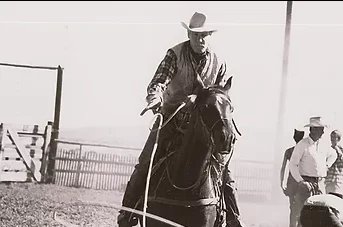Roger Joe Claytor was born on May 23, 1923 in Alcova WY, the seventh of eight children born to Mattie and Lon Claytor. Rog was born into a pioneer ranching family. His grandparents, Jake and Martha Ervay, arrived in Wyoming in 1881 after traveling from Texas in two covered wagons, settling at the Pick Ranch. His parents, Mattie Boney Ervay and Lon Claytor operated the Little Cross L, Cross L and Nine A ranches.
Rog grew up on the Cross L and 9A ranches, attending grade school at the 9A with his younger sister and two nieces. He graduated from Natrona County High School in 1941. He attended the University of Wyoming for one year before joining the Navy. He was stationed in the South Pacific for the duration of World War II and served during the invasion of Borneo.
After being discharged from the Navy he worked for the 9A Ranch, the Circle Bar Ranch and for Ben Roberts at the Bug Ranch. During the Blizzard of ’49 he helped Ben Roberts drive 1700 head of cattle to the Big Horn Basin. In October of 1949 he went to work for Miles Land and Livestock Co. where he would work up until his death. He married Margaret Jepson Taylor in June 1951. He had one son, Elmer Taylor and three grandchildren.
Rog was the quintessential cowboy. He could handle any job given to him. He could ride anything, rope anything and fix anything, as long as he had a little baling wire. Always the first one to the barn and saddled up, he was known for his dependability and toughness. He knew well all the ranches and landmarks throughout Natrona and Carbon counties. It didn’t matter which ranch was signing his paycheck he was willing to ride for whatever brand needed help. He was, more often than not, assigned the big circle because everyone knew he could handle it best.
During his years at Miles Land and Livestock he taught two generations of kids and cowhands everything from horsemanship to fence building to calving heifers. He had little patience for shenanigans and would often be heard saying, “that’s what the night before is for” or “we’re burnin’ daylight!” if he had to wait on someone to tinker with their saddle, when they should have already been mounted up. Everywhere he worked he treated the job as his responsibility 24 hours a day, seven days a week, including holidays and seldom, if ever, took a vacation.
Although he won no formal awards or accolades, he did win the admiration and respect of several generations of top hands throughout central Wyoming. On the day we gathered to lay him to rest, it was standing room only and cowboys, hats in hands, even stood outside in the cold January wind to say goodbye. Cowboys and cowgirls from three generations came that day with tears in their eyes to thank a man who taught them, not through words but through deeds, how to live the cowboy way.


